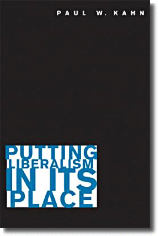His most recent book is Out of Eden: Adam and Eve and the Problem of Evil, which David Luban "called an extraordinary, deeply original reflection on the nature of evil."
I asked Paul to apply the "page 69 test" to his book. Here is his reply:

Page 69 begins one of my favorite sections of the book – one in which I take on something that most people would think quite impossible. I offer a unified theory of the shifting forms of religious experience in the West. We move from the Judaic experience of the sacred as separated from man by a gap that can be bridged only by law and sacrifice, to the early Christian experience of the sacred as immanent (the body of Christ), and on to the Protestant experience of the sacred as that which survives the self-reflection of Enlightenment doubt. This is a characteristic movement of Western thought: to conceive of order first as the product of an intelligent maker, then as not made but rather as an organic whole of which we are already a part, and finally to apply the critique of reason self-reflexively.Many thanks to Paul for the input.
I am interested in this history because each form of the sacred produces its own conception of evil. Evil, I argue, is always a failure of the sacred. Thus, as the shape of the experience of the sacred shifts, so does the form of evil. For example, evil for the Jews is idolatry; it is to locate the sacred in that which is really nothing at all. For the Christians, though, evil is the failure to take up the presence of Christ. It is to remain bound to law as the only way to cross the gap between the finite and the infinite, after Christ has announced the end of law.
The history of the forms of the sacred allows us to see that evil is neither a pathology of reason nor one of interest. Rather, evil arises out of the pursuit of the infinite by a finite being. The myth of Adam and Eve tells us that we cannot help but seek to return to Eden, where we did not experience the knowledge of our own death. Evil and the flight from death have been conjoined from the beginning. When finite man transcends death through an experience of the sacred, we call it love. When he flees from death, claiming for himself the power of the infinite, he becomes evil.
Here is the publisher's description of the book:
In Out of Eden, Paul W. Kahn offers a philosophical meditation on the problem of evil. He uses the Genesis story of the Fall as the starting point for a profound articulation of the human condition. Kahn shows us that evil expresses the rage of a subject who knows both that he is an image of an infinite God and that he must die. Kahn's interpretation of Genesis leads him to inquiries into a variety of modern forms of evil, including slavery, torture, and genocide.
Kahn takes issue with Hannah Arendt's theory of the banality of evil, arguing that her view is an instance of the modern world's lost capacity to speak of evil. Psychological, social, and political accounts do not explain evil as much as explain it away. Focusing on the existential roots of evil rather than on the occasions for its appearance, Kahn argues that evil originates in man's flight from death. He urges us to see that the opposite of evil is not good, but love: while evil would master death, love would transcend it.
Offering a unique perspective that combines political and cultural theory, law, and philosophy, Kahn here continues his project of advancing a political theology of modernity.
Out of Eden will be available this week.
Also from Princeton University Press, Kahn's Putting Liberalism in Its Place (2004):
"In this lucid, powerfully reasoned, deeply original major new contribution to contemporary political thought, Paul Kahn X-rays the liberal faith, summoning it to a new honesty regarding its own purposes, unacknowledged motivations, blind spots and limitations, and challenging it to a find a new, if perhaps more modest, place in the world."--Jonathan Schell, author of The Unconquerable World and The Fate of the Earth
Previous "page 69 tests":
Paul Lewis, Cracking Up
Pagan Kennedy, Confessions of a Memory Eater
David Greenberg, Nixon's Shadow
Duane Swierczynski, The Wheelman
George Levine, Darwin Loves You
John Barlow, Intoxicated
Alicia Steimberg, The Rainforest
Alan Wolfe, Does American Democracy Still Work?
John Dickerson, On Her Trail
Marcus Sakey, The Blade Itself
Randy Boyagoda, Governor of the Northern Province
John Gittings, The Changing Face of China
Rachel Kadish, Tolstoy Lied
Eric Rauchway, Blessed Among Nations
Tim Brookes, Guitar and other books
Ruth Padel, Tigers in Red Weather
William Haywood Henderson, Augusta Locke
Jed Horne, Breach of Faith
Robert Greer, The Fourth Perspective
David Plotz, The Genius Factory
Michael Allen Dymmoch, White Tiger
Patrick Thaddeus Jackson, Civilizing the Enemy
Tom Lutz, Doing Nothing
Libby Fischer Hellmann, A Shot To Die For
Nelson Algren, The Man With the Golden Arm
Bob Harris, Prisoner of Trebekistan
Elaine Flinn, Deadly Collection
Louise Welsh, The Bullet Trick
Gregg Hurwitz, Last Shot
Martha Powers, Death Angel
N.M. Kelby, Whale Season
Mario Acevedo, The Nymphos of Rocky Flats
Dominic Smith, The Mercury Visions of Louis Daguerre
Simon Blackburn, Lust
Linda L. Richards, Calculated Loss
Kevin Guilfoile, Cast of Shadows
Ronlyn Domingue, The Mercy of Thin Air
Shari Caudron, Who Are You People?
Marisha Pessl, Special Topics in Calamity Physics
John Sutherland, How to Read a Novel
Steven Miles, Oath Betrayed
Alan Brown, Audrey Hepburn's Neck
Richard Dawkins, The Ancestor's Tale
--Marshal Zeringue





